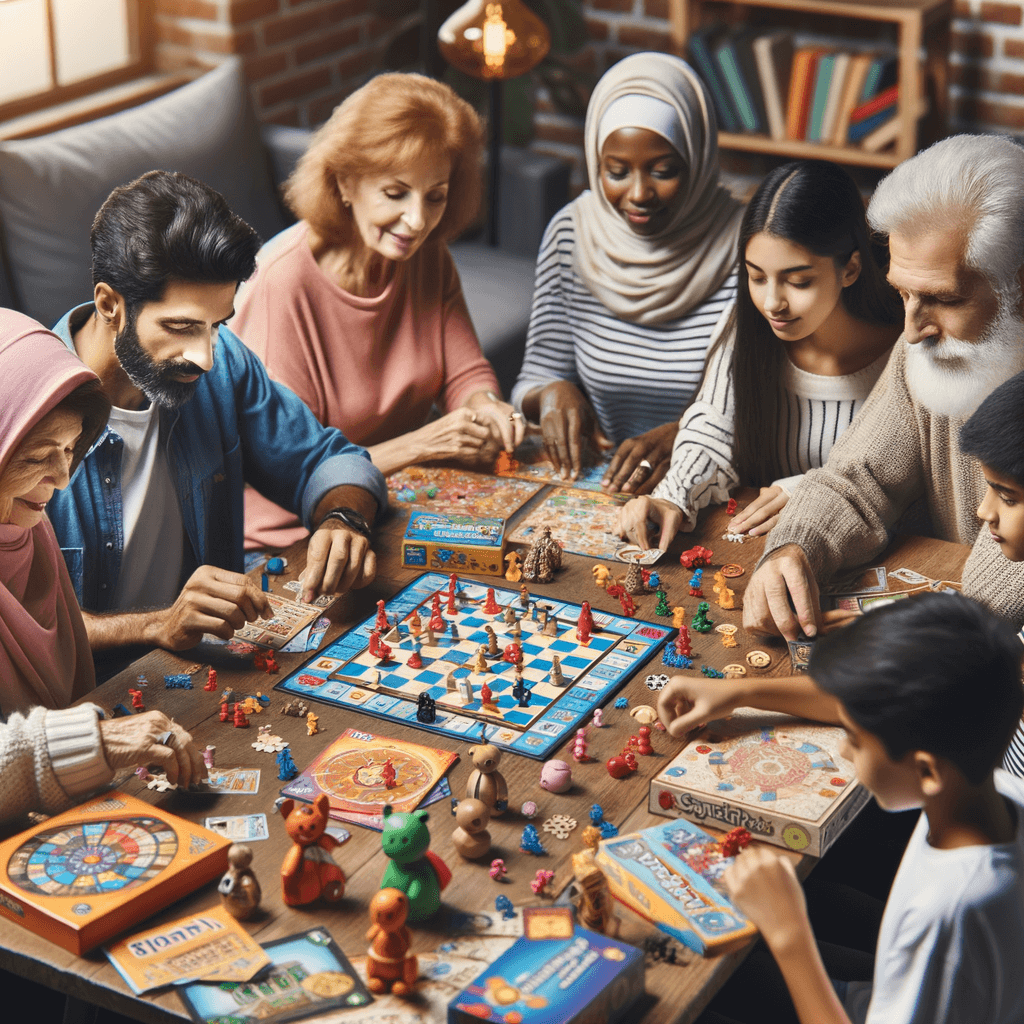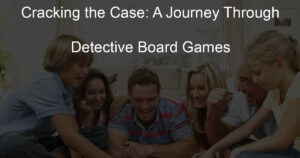Introduction to Board Games for Problem Solving
Hey there, game lovers! Ever thought about how your favorite board games can help you solve problems? Well, buckle up, because we’re about to dive into a world where fun meets learning. Let’s get started!
-
- Understanding the concept of board games as problem-solving tools
Board games are not just about rolling dice and moving pieces around a board. They are powerful tools that can help us develop problem-solving skills. When we play, we’re constantly making decisions, planning strategies, and dealing with unexpected challenges. It’s like a workout for our brains! Wikipedia has a cool page about this if you want to learn more.
-
- Historical perspective of board games and problem solving
Did you know that board games have been around for thousands of years? Ancient civilizations like the Egyptians and the Greeks used them for entertainment, but also to teach strategy and planning. They understood that games can help us think better and solve problems more effectively. Pretty smart, huh?
-
- Benefits of using board games for problem solving
Playing board games can make you a better problem solver in many ways. They can improve your memory, increase your attention span, and help you think more creatively. Plus, they’re a great way to have fun and spend time with friends and family. It’s a win-win!
So, are you ready to roll the dice and start your problem-solving adventure? Stay tuned for more about real-world problem solving games, educational board games, and how we can learn through play. Let’s game on!

Real-World Problem Solving Games
Hey there, game lovers! Ever thought about how your favorite board games can help you solve real-world problems? Let’s dive into some cool examples.
Examples of Real-World Problem Solving Games
Here are some games that not only provide fun but also challenge your problem-solving skills:
-
- Pandemic: A game of global crisis management
Ever imagined being a disease-fighting specialist? In Pandemic, you and your team must work together to stop deadly diseases from spreading across the globe. It’s a race against time as you travel around the world, treating infections and finding cures. This game tests your strategic thinking and teamwork skills, just like real-world crisis managers!
-
- Power Grid: A game of economic strategy and resource management
How about running your own power company? In Power Grid, you compete against other players to supply the most cities with power. You’ll need to buy power plants, purchase resources, and expand your network. It’s all about making smart economic decisions and managing resources – skills that are super useful in real life too!
-
- Twilight Struggle: A game of geopolitical strategy during the Cold War
Ready to step into the shoes of a Cold War leader? Twilight Struggle is a game where you and an opponent battle for global influence during the Cold War. You’ll need to make tough decisions and strategic moves to gain an advantage. It’s a great way to learn about history and geopolitics, and it also hones your strategic thinking skills.
So, why not give these games a try? They’re not just fun – they’re also a great way to practice problem-solving and learn about the world. Happy gaming!
How these games simulate real-world challenges
Ever wondered how board games can mirror real-life problems? Let’s dive into some cool examples!
- Case study: Pandemic and crisis managementEver played the board game Pandemic? It’s not just about fun, it’s about saving the world! In this game, you and your friends team up to fight deadly diseases. You have to think fast, work together, and make tough choices. Just like real-world crisis managers, you need to plan ahead and adapt to new challenges. It’s a great way to learn about teamwork and problem-solving.
- Case study: Power Grid and resource managementNext up is Power Grid, a game all about energy and economy. You’re in charge of a power company, and your goal is to supply electricity to cities. You’ll have to manage resources, bid on power plants, and keep an eye on your competitors. It’s a lot like running a real business! This game can teach you about strategy, planning, and resource management.
- Case study: Twilight Struggle and geopolitical strategyFinally, let’s talk about Twilight Struggle. This game takes you back to the Cold War, a time of political tension and secret strategies. You’ll have to make tough decisions, balance power, and try to influence other countries. It’s a great way to learn about history, politics, and strategic thinking.
So, as you can see, board games can be more than just fun. They can help us understand and tackle real-world problems. Ready to play?
Educational Board Games
Board games aren’t just for fun anymore. They’ve evolved into powerful educational tools that can help kids learn and grow in amazing ways. Let’s dive into the world of educational board games and see what they have to offer.
Benefits of Educational Board Games
Playing educational board games can have a lot of benefits for kids. Here are some of the top ones:
-
- Enhancing Critical Thinking Skills
Board games often require players to think critically and make strategic decisions. This can help kids develop their critical thinking skills, which are essential for success in school and life. For example, in a game like Chess, players have to anticipate their opponent’s moves and come up with strategies to win. This kind of thinking can help kids become better problem solvers and decision makers.
-
- Improving Problem-Solving Abilities
Many board games present players with problems that they have to solve in order to win. This can help kids improve their problem-solving abilities. For instance, in a game like Scrabble, players have to figure out how to make the highest scoring word with the letters they have. This kind of problem-solving can help kids become more creative and flexible thinkers.
-
- Promoting Teamwork and Collaboration
Many board games require players to work together as a team to achieve a common goal. This can help kids learn how to collaborate and work well with others. For example, in a game like Settlers of Catan, players have to negotiate and trade with each other to get the resources they need. This can help kids learn important social skills like communication, negotiation, and cooperation.
So, as you can see, educational board games can be a great way for kids to learn and grow. They’re fun, engaging, and packed with learning opportunities. So why not give them a try?
Examples of Educational Board Games
Let’s dive into some examples of educational board games that are not only fun to play but also help in enhancing various skills. These games are a great way to learn while having fun!
Scrabble: This classic word game is a fantastic way to enhance vocabulary and spelling skills. Players use their tiles to create words on the game board, earning points based on the letters used and their placement on the board. It’s a fun and challenging way to learn new words and improve your spelling. Learn more about Scrabble here.
Chess: Chess is a strategic game that requires players to think several moves ahead. It’s a great way to improve strategic thinking and foresight. Each piece on the chess board has its own unique movement, and the goal is to checkmate the opponent’s king. This game requires a lot of thinking and planning, making it a great tool for enhancing problem-solving skills. Find out more about Chess here.
- Settlers of Catan: This popular board game teaches resource management and negotiation skills. Players collect resources and use them to build roads, settlements, and cities. They can also trade resources with other players. It’s a fun and interactive way to learn about managing resources and negotiating with others. Discover more about Settlers of Catan here.
These are just a few examples of the many educational board games out there. So, why not try one out? You’ll have fun and learn something new at the same time!
Learning Through Board Games
Board games are not just about fun and entertainment. They can also be a great tool for learning. Let’s dive into how board games can help us develop our critical thinking skills.
Board Games and Critical Thinking
When we talk about board games, we often think about the fun and excitement they bring. But did you know that board games can also help improve your critical thinking skills? Let’s find out how!
-
- How board games promote critical thinking
Board games often require players to make strategic decisions, analyze situations, and predict outcomes. This process helps to develop and enhance critical thinking skills. For example, in a game of chess, you need to think several moves ahead and anticipate your opponent’s strategy. This kind of thinking promotes problem-solving skills and logical reasoning, which are key components of critical thinking.
-
- Examples of board games that enhance critical thinking
There are plenty of board games out there that can help you improve your critical thinking skills. Here are a few examples:
-
- Chess: This classic game is all about strategy and foresight. You need to think several moves ahead and anticipate your opponent’s moves.
- Clue: This detective game requires players to use deductive reasoning to solve a mystery.
- Settlers of Catan: This game requires players to make strategic decisions based on resource management and trading.
So, the next time you play a board game, remember that you’re not just having fun. You’re also sharpening your critical thinking skills. Happy gaming!
Board Games for Skills Development
Board games are not just fun to play, but they also help us develop important skills. Let’s explore some of the ways board games can help us grow.
-
- Board games for developing strategic thinking
Strategic thinking is all about planning ahead and making smart decisions. Board games like Chess and Risk are great for developing this skill. In these games, you have to think several moves ahead and consider the possible outcomes of your actions. This helps to improve your ability to strategize and plan, which is a valuable skill in many areas of life.
-
- Board games for enhancing communication skills
Communication is key in many board games. Games like Charades and Pictionary require players to communicate effectively with their team members to win. These games can help improve your ability to express your thoughts clearly and understand others, which is a vital skill in both personal and professional settings.
-
- Board games for improving decision-making abilities
Many board games require players to make decisions that will affect the outcome of the game. Games like Monopoly and Settlers of Catan involve a lot of decision-making, from deciding where to build your settlements to choosing whether to trade resources. These games can help improve your decision-making abilities, teaching you to consider all the options and make the best choice.
So, the next time you play a board game, remember that you’re not just having fun – you’re also developing important skills!
Real-World Issues in Board Games
Hey there, board game enthusiasts! Ever noticed how some of our favorite games mirror real-life situations? Let’s dive into that.
Board Games and Real-World Applications
Board games aren’t just about fun and games. They can also teach us about the world around us. Let’s explore how!
-
- How board games mirror real-world scenarios
Board games often reflect real-life situations. For example, the game of Monopoly? It’s all about real estate, right? It teaches us about buying, selling, and investing in properties, just like in the real world. Or, consider the game of Life. It takes us through different life stages, including education, career, and retirement. Pretty cool, huh?
-
- Examples of board games with real-world applications
Let’s look at some more examples. Ever played Pandemic? This cooperative game requires players to work together to stop the spread of diseases across the globe. It’s a great way to understand how diseases spread and how teamwork can help combat them. Another example is Ticket to Ride. This game involves building train routes across different cities. It can teach us about geography and strategic planning. Check out these games if you haven’t already!
So, the next time you play a board game, remember – it’s not just a game. It’s a fun way to learn about the world around us!
Board Games for Learning
Hey there, game lovers! Ever thought about how much you can learn from board games? Well, you’re about to find out!
-
- How board games facilitate learning
Board games are more than just fun. They’re like a secret classroom where you don’t even realize you’re learning! They help us develop critical thinking skills, improve our memory, and even boost our vocabulary. When we play board games, we’re constantly making decisions, planning strategies, and solving problems. All these activities stimulate our brain and make learning a fun and engaging process. Plus, they teach us about winning and losing gracefully. Now, isn’t that a cool way to learn?
-
- Examples of board games used for educational purposes
There are tons of board games out there that are designed to make learning fun. Let’s take a look at a few examples:
| Board Game | What You Learn |
|---|---|
| Scrabble | Improves vocabulary and spelling skills |
| Monopoly | Teaches money management and strategic thinking |
| Chess | Enhances problem-solving skills and strategic thinking |
| Risk | Helps understand world geography and strategic planning |
So, the next time you play one of these games, remember you’re not just having fun, you’re also learning something new!
Conclusion: The Power of Board Games in Problem Solving
As we wrap up our journey through the world of board games, let’s take a moment to reflect on the incredible power they hold in helping us develop our problem-solving skills. Board games are more than just a fun pastime; they’re a tool for learning, growing, and challenging ourselves.
-
- Recap of the benefits of board games for problem solving
Throughout this post, we’ve explored how board games can help us in real-world problem-solving scenarios. They teach us to strategize, to think critically, and to adapt to changing circumstances. Games like Monopoly and Chess have been proven to improve cognitive abilities and foster a sense of competition and cooperation. Educational board games also play a significant role in teaching kids about real-world issues in a fun and engaging way.
-
- Future trends in problem-solving board games
Looking ahead, we can expect to see even more innovation in the world of problem-solving board games. With the rise of technology, we might see more digital board games that combine the best of both worlds. We might also see games that tackle more complex real-world issues, helping players to understand and navigate these challenges in a safe and supportive environment. The future of board games is bright, and we can’t wait to see where it takes us.
So, the next time you sit down to play a board game, remember: you’re not just having fun, you’re also sharpening your problem-solving skills. And who knows? You might just be playing the board game of the future!



